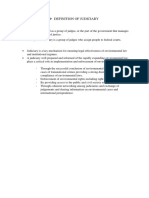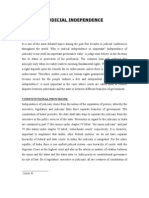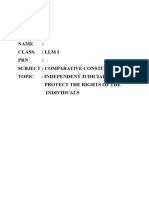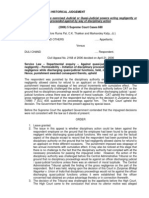0 ratings0% found this document useful (0 votes)
90 viewsChapter 06: Judiciary Any 1 Question Out of 4 Likely To Come in Exam
The judiciary plays several key roles:
1. It acts as a balancing wheel of the federation and keeps equilibrium between fundamental rights and social justice.
2. It resolves disputes between citizens, citizens and government, and between state and central governments.
3. It has the power of judicial review to overturn laws passed by Parliament that violate the constitution.
Uploaded by
Aqib ShaikhCopyright
© © All Rights Reserved
Available Formats
Download as DOCX, PDF, TXT or read online on Scribd
0 ratings0% found this document useful (0 votes)
90 viewsChapter 06: Judiciary Any 1 Question Out of 4 Likely To Come in Exam
The judiciary plays several key roles:
1. It acts as a balancing wheel of the federation and keeps equilibrium between fundamental rights and social justice.
2. It resolves disputes between citizens, citizens and government, and between state and central governments.
3. It has the power of judicial review to overturn laws passed by Parliament that violate the constitution.
Uploaded by
Aqib ShaikhCopyright
© © All Rights Reserved
Available Formats
Download as DOCX, PDF, TXT or read online on Scribd
You are on page 1/ 4
Chapter 06: Judiciary
Any 1 question out of 4 likely to come in exam.
1. What is the Role of Judiciary:
It is a balancing wheel of the federation;
It keeps equilibrium between fundamental rights and social justice;
It forms all forms of authorities within the bounds;
It controls the Administrative Tribunals.
1. Dispute Resolution: Whenever there is a dispute, the courts intervene in
providing solutions. Whether it’s a dispute between citizens, citizens, and
government, or between two state governments or even the central and state
governments, the court is responsible for dispute resolution.
2. Judicial Review: The judiciary has the final hold on the Constitution of India. As
such, if there is any violation of the fundamentals of the constitution, the court can
even overwrite laws passed by the Parliament. This process is called Judicial Review.
3. Upholding the Law and Enforcing Fundamental Rights: Almost all Fundamental
Rights of Indian citizens are defined in our constitution. In case, any citizen feels that
any of such rights are violated, they can approach their local high courts or the
Supreme Court.
2. What are the Functions of Judiciary:
(1) It interprets the laws:
Some matters are brought before them in which the laws are silent. In these cases or matters
the judges give their decisions where the question of the interpretation of the laws arises,
because in such cases the law is not clear. Later, these decisions are quoted in similar cases,
expanding the laws in an indirect manner.
(2) Protector of Civil Rights:
People are given many rights by the state through the laws of the Parliament. The courts
protect these rights.
(3) Decides the cases:
Many cases relating to the disputes between the citizens, or between the government and the
citizens, are brought before the courts. The courts give their decisions on such disputes.
(4) Custodian of fundamental rights:
The Supreme Courts act as the custodian of the Fundamental rights. If a person loses his
rights, an appeal can be filed in a High Court or the Supreme Court for the protection of
fundamental rights. It is the duty of the courts to protect the rights of the citizens. Our High
Courts and Supreme Court have decided many cases in which the question of the violation of
the fundamental rights was involved.
(5) Guardian of the Constitution:
If a law passed by the Congress violates the Constitution, that law shall be declared as void
because the Constitution is the highest law of the land and it is the duty of the courts to
protect it. The principle which was devised by Chief Justice Marshall is known as Judicial
Review. For the protection of the Constitution many laws have been declared illegal which
violated any law or any clause of the Constitution.
(6) Decides the conflicts of jurisdiction between the Centre and State Governments in
Federations:
In federal constitutions there is a division of powers between the Centre and the States. There
is a possibility of disputes arising between the Centre and the State over the jurisdiction.
Therefore, the Supreme Court is given the right to decide these disputes.
3. Write a short note on Principle of Independence of
Judiciary:
1. The independence of the judiciary shall be guaranteed by the State and enshrined in the
Constitution or the law of the country. It is the duty of all governmental and other institutions
to respect and observe the independence of the judiciary.
2. The judiciary shall decide matters before them impartially, on the basis of facts and in
accordance with the law, without any restrictions, improper influences, inducements,
pressures, threats or interferences, direct or indirect, from any quarter or for any reason.
3. The judiciary shall have jurisdiction over all issues of a judicial nature and shall have
exclusive authority to decide whether an issue submitted for its decision is within its
competence as defined by law.
4. There shall not be any inappropriate or unwarranted interference with the judicial process,
nor shall judicial decisions by the courts be subject to revision. This principle is without
prejudice to judicial review or to mitigation or commutation by competent authorities of
sentences imposed by the judiciary, in accordance with the law.
5. Everyone shall have the right to be tried by ordinary courts or tribunals using established
legal procedures. Tribunals that do not use the duly established procedures of the legal
process shall not be created to displace the jurisdiction belonging to the ordinary courts or
judicial tribunals.
6. The principle of the independence of the judiciary entitles and requires the judiciary to
ensure that judicial proceedings are conducted fairly and that the rights of the parties are
respected.
7. It is the duty of each Member State to provide adequate resources to enable the judiciary to
properly perform its functions.
4. Write a Short Note on Doctrine of Judicial Review:
Judicial Review is nothing but “a court proceeding in which a judge reviews the lawfulness
of a decision or action made by a public body.” It has the origin in theory of limited
government and in the theory of two laws viz.. an ordinary law and a supreme law. Courts
must realize that there is no shortage of problems in and before the country, which courts
cannot solve. What persists today is the firm belief that courts cannot interfere with
government policy as a matter of routine. It is judicial activism and that doesn’t mean judicial
adventurism. Judges should never turn out to be judicial activists as it is sometimes useful for
the adjunct to democracy. What we understand today is what we see or read from medias or if
you are a lawyer or judge carrying out your duties. The real essence of judicial review is still
hidden and it has a wide range of connotations. Life is all about having rights and performing
duties not harming or aiming at others. Courts are put up to ensure that people’s rights are
enjoyed properly and that no one is hurt.
The subject matter of every judicial review is a decision made by a person in power or it can
even be the failure of that person to make decision. Nonetheless, it is important to note that in
judicial review it is always the legality of the decision that is explored by the courts. Legality
is the most important concept when it comes to the organs of government. The legality of the
decision taken is often explored by the courts. The action or decision in question is brought
before a judge in court proceedings where the lawfulness of the decision is tested. The main
purpose of judicial review is to ensure that the public authorities don’t misuse their power.
The concept of Judicial review focuses:
to determine the unconstitutionality of Legislative Acts
to maintain supremacy of the Constitutional Law
to protect the Fundamental Rights
to maintain federal equilibrium between Centre and the States
to check arbitrariness, unjust harassing and unconstitutional laws
You might also like
- Principles of Legislation and Legislative Drafting50% (2)Principles of Legislation and Legislative Drafting23 pages
- Lesson 10 Functions of The Judicial BranchNo ratings yetLesson 10 Functions of The Judicial Branch4 pages
- Legislation Notes: Judiciary:: 1. To Give Justice To The PeopleNo ratings yetLegislation Notes: Judiciary:: 1. To Give Justice To The People8 pages
- The Judiciary of Pakistan Is A Hierarchical System With Two Classes of CourtsNo ratings yetThe Judiciary of Pakistan Is A Hierarchical System With Two Classes of Courts3 pages
- Unit - 1 - Intro To Legal Sys and ConceptsNo ratings yetUnit - 1 - Intro To Legal Sys and Concepts47 pages
- Legislature: Meaning, Functions and Types of Legislature100% (1)Legislature: Meaning, Functions and Types of Legislature8 pages
- Functions of Judiciary and Quasi-JudiciaryNo ratings yetFunctions of Judiciary and Quasi-Judiciary2 pages
- Judicial Independence: Constitutional ProvisionsNo ratings yetJudicial Independence: Constitutional Provisions10 pages
- Independent Judiciary Can Protect The Rights of The IndividualsNo ratings yetIndependent Judiciary Can Protect The Rights of The Individuals13 pages
- Austin Has Defined Administrative Law. As The Law, Which Determines The Ends and Modes ToNo ratings yetAustin Has Defined Administrative Law. As The Law, Which Determines The Ends and Modes To8 pages
- Term Paper For Constitutional Law 1 - Final100% (1)Term Paper For Constitutional Law 1 - Final25 pages
- Unit - Rule of Law and Criminal Justice in IndiaNo ratings yetUnit - Rule of Law and Criminal Justice in India5 pages
- Syllabus Mid Term Admin Law: Nature and Scopes of Administrative LawNo ratings yetSyllabus Mid Term Admin Law: Nature and Scopes of Administrative Law3 pages
- Week 1 - Introduction To Australian Law - Tutorial Questions (Without Answers)No ratings yetWeek 1 - Introduction To Australian Law - Tutorial Questions (Without Answers)4 pages
- users-guide-to-the-trans-tasman-mutual-recognition-arrangementNo ratings yetusers-guide-to-the-trans-tasman-mutual-recognition-arrangement30 pages
- The Maharashtra State Tax On Professions, Trade, Callings and Employments Act, 1975No ratings yetThe Maharashtra State Tax On Professions, Trade, Callings and Employments Act, 197534 pages
- Gazette Copy of West Bengal Real Estate Regulationand Development Rules 2021No ratings yetGazette Copy of West Bengal Real Estate Regulationand Development Rules 202150 pages
- Recovery of Debts Due To Banks and Financial Institutions With Reference To DRT and DRAT: A Comparative Analysis of India and NepalNo ratings yetRecovery of Debts Due To Banks and Financial Institutions With Reference To DRT and DRAT: A Comparative Analysis of India and Nepal15 pages
- Naveen Ahlawat Points For Argument - 30.4.2024No ratings yetNaveen Ahlawat Points For Argument - 30.4.20242 pages
- Reportable: (Delhi University Contract Employees Union and Anr. vs. University of Delhi and Ors.)No ratings yetReportable: (Delhi University Contract Employees Union and Anr. vs. University of Delhi and Ors.)23 pages
- Construction Arbitration in Sri Lanka: Management, Procurement and Law Volume 165 Issue MP2No ratings yetConstruction Arbitration in Sri Lanka: Management, Procurement and Law Volume 165 Issue MP24 pages
- State of Punjab Vs VK Khanna Ors On 30 November 2000No ratings yetState of Punjab Vs VK Khanna Ors On 30 November 200016 pages
- SC Judgement - Exercised Judicial or Quasi Judicial Powers100% (2)SC Judgement - Exercised Judicial or Quasi Judicial Powers2 pages
- 5th V.M. Tarkunde Memorial Lecture, 2011No ratings yet5th V.M. Tarkunde Memorial Lecture, 20117 pages
- Amco Republic of Resubmitted Decision: Indonesia: Case On JurisdictionNo ratings yetAmco Republic of Resubmitted Decision: Indonesia: Case On Jurisdiction13 pages
- Principles of Legislation and Legislative DraftingPrinciples of Legislation and Legislative Drafting
- Legislation Notes: Judiciary:: 1. To Give Justice To The PeopleLegislation Notes: Judiciary:: 1. To Give Justice To The People
- The Judiciary of Pakistan Is A Hierarchical System With Two Classes of CourtsThe Judiciary of Pakistan Is A Hierarchical System With Two Classes of Courts
- Legislature: Meaning, Functions and Types of LegislatureLegislature: Meaning, Functions and Types of Legislature
- Independent Judiciary Can Protect The Rights of The IndividualsIndependent Judiciary Can Protect The Rights of The Individuals
- Austin Has Defined Administrative Law. As The Law, Which Determines The Ends and Modes ToAustin Has Defined Administrative Law. As The Law, Which Determines The Ends and Modes To
- Syllabus Mid Term Admin Law: Nature and Scopes of Administrative LawSyllabus Mid Term Admin Law: Nature and Scopes of Administrative Law
- Week 1 - Introduction To Australian Law - Tutorial Questions (Without Answers)Week 1 - Introduction To Australian Law - Tutorial Questions (Without Answers)
- users-guide-to-the-trans-tasman-mutual-recognition-arrangementusers-guide-to-the-trans-tasman-mutual-recognition-arrangement
- The Maharashtra State Tax On Professions, Trade, Callings and Employments Act, 1975The Maharashtra State Tax On Professions, Trade, Callings and Employments Act, 1975
- Gazette Copy of West Bengal Real Estate Regulationand Development Rules 2021Gazette Copy of West Bengal Real Estate Regulationand Development Rules 2021
- Recovery of Debts Due To Banks and Financial Institutions With Reference To DRT and DRAT: A Comparative Analysis of India and NepalRecovery of Debts Due To Banks and Financial Institutions With Reference To DRT and DRAT: A Comparative Analysis of India and Nepal
- Reportable: (Delhi University Contract Employees Union and Anr. vs. University of Delhi and Ors.)Reportable: (Delhi University Contract Employees Union and Anr. vs. University of Delhi and Ors.)
- Construction Arbitration in Sri Lanka: Management, Procurement and Law Volume 165 Issue MP2Construction Arbitration in Sri Lanka: Management, Procurement and Law Volume 165 Issue MP2
- State of Punjab Vs VK Khanna Ors On 30 November 2000State of Punjab Vs VK Khanna Ors On 30 November 2000
- SC Judgement - Exercised Judicial or Quasi Judicial PowersSC Judgement - Exercised Judicial or Quasi Judicial Powers
- Amco Republic of Resubmitted Decision: Indonesia: Case On JurisdictionAmco Republic of Resubmitted Decision: Indonesia: Case On Jurisdiction

























































































